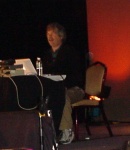 The keynote for this morning is Alan Kay and is entitled "Daddy, are we there yet?" Alan is the inventor of SmallTalk, among other things and he has utah ties, getting his PhD from the Univ. of Utah in 1969. His primary complaint is that the last 20 years have been pretty darn boring because we're spending our time making better buggy whips in the form of better spreadsheets, better ways to write memos, etc. Alan quotes from a paper written in 1963 called "Man-Computer Symbiosis:" In not too many years, human being and computing machined will be coupled together very tightly and the resulting partnership will think as no human brain has ever thought before. he claims that this hasn't happened in large part yet, although I'd argue that networked computing has allowed some of us have made some progress in that direction.
The keynote for this morning is Alan Kay and is entitled "Daddy, are we there yet?" Alan is the inventor of SmallTalk, among other things and he has utah ties, getting his PhD from the Univ. of Utah in 1969. His primary complaint is that the last 20 years have been pretty darn boring because we're spending our time making better buggy whips in the form of better spreadsheets, better ways to write memos, etc. Alan quotes from a paper written in 1963 called "Man-Computer Symbiosis:" In not too many years, human being and computing machined will be coupled together very tightly and the resulting partnership will think as no human brain has ever thought before. he claims that this hasn't happened in large part yet, although I'd argue that networked computing has allowed some of us have made some progress in that direction.
To prove his point, Alan is going through four or five examples (all with live demos and video which is pretty cool) of really neat, revolutionary computer science breakthrough including Ivan Sutherland's Sketchpad and McCarthy's LISP 1.5 implementation for the PDP-1. He is now showing what is likely the first collaborative software system: Engelbart's NLS. Built in 1968, it had live full motion video conferencing and concurrent document editing with shared cursors.
Alan shows something called "end user computer literacy" which is a graphical LOGO-like environment where users draw things like cars and steering wheels and then connect them together using scripts they build from property panels. It doesn't sound dearly as impressive as it was to see. The goal is to get kids building programs and using it to do experiments. One of the examples is using the system to explore the notion of a gravitational acceleration constant.
The base system is called Squeak. Squeak is the programming language and the OS. Its a grand total of 2.8M of binaries. One interesting thing he showed was that his presentation was actually a sequence of desktops so that each slide was a fully functional view. This made for some pretty cool demos.




